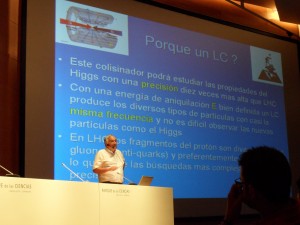While the linear collider scientific community was discussing the next steps to propose a future machine for particle physics at the LCWS11 conference, a crowded audience gathered to listen to a public lecture entitled “Journey to the heart of matter,” given by François Richard on 27 September in Granada, Spain at the Parque de la Ciencias, one of the major science museums in Spain. Audience members enjoyed asking him diverse questions on matter, the vacuum, the universe, and of course the International Linear Collider during the question-and-answer session that followed.
Richard posed his own questions to the audience during his talk: Why are there three families of leptons when we observe stable objects that are only made of the first one? Why are there fourteen orders of magnitude of difference between the neutrino and the top quark masses? Are these numbers just random or deterministic? Could there be other parallel universes where nature made other choices?
Using such questions as motivators for high-energy physics research, François Richard, French CNRS researcher at LAL, Orsay and former European contact for the ILC research director and co-chair of the Worldwide Study, emphasised that these mysteries are exceedingly puzzling, prompting thinkers to suggest that our universe is a result of a Darwinian-like selection, better known as the anthropic principle. But if such notions are not acceptable to us, Richard said, we must look for fundamental laws that govern nature, and answer these questions by looking to the universe’s smallest constituents. Quoting Averroes, a famous Andalusian Muslim philosopher from the 12th century who mastered theology, law, mathematics, physics and other sciences, he noted that “In nature, nothing is superfluous.”
In lay Spanish language, he also explained the purpose of the Large Hadron Collider and why, complementary to the LHC, a linear collider is necessary to accurately observe and understand new particles such as the Higgs boson, and maybe, to answer one of the deep questions of science, the origin of particle masses.
After Richard made his case for a linear collider, the enthusiastic audience members followed up with a variety of questions from the place of string theory in physics to how we would know when we’ve finally reached the search-ending most-fundamental particle. They also asked very concrete questions about how much a future linear collider would cost and what would be applications of particle physics research to society, even if no major discoveries were made.
To a question about when there would be a final ILC design, Richard responded that it had to be the result of a global effort, and that it would depend on what the LHC discovers. Referring to the LCWS11 workshop, Richard concluded: “Let’s hope that the marvelous city of Granada will inspire us to define the next steps of our exploration of matter.”
During the LCWS11 concluding talk, Jonathan Bagger, chair of the ILC Steering Committee, advised physicists to meet and convince the outside community of the importance of particle physics. “Good science is not enough,” he said, “we need to engage the public.” That night in Granada, Richard demonstrated the effectiveness of that advice.



Recent Comments